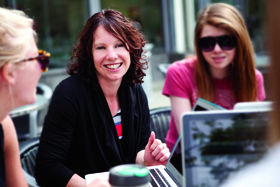
 Dr Kirsten Robertson
Dr Kirsten Robertson
It's easier to communicate with people if you know how they think.
So a background in social psychology gives Kirsten Robertson an edge when it comes to researching and teaching marketing behaviour.
Seeking to understand consumers has led Kirsten to investigate such diverse phenomena as student drinking and music piracy, with surprising results.
She's found attitudes that suggest we need to reconsider how we try to curtail binge drinking and illegal music downloads.
Anti-piracy messages push the idea that people shouldn't steal music from the internet because they wouldn't steal CDs from a store — but Kirsten has found that many people would also steal from stores if they could be sure of getting away with it.
“Rather than appealing to honesty, it might be more effective to focus the message more on the likelihood of being caught.”
Her research also suggests that we need to look at alternative ways of addressing efforts to reduce excessive drinking and its associated ills.
“There's not a lot to be gained by suggesting people should limit the number of standard drinks they have when few people can identify a standard drink, and when people tend to underestimate the amount they drink – particularly heavy drinkers.
“Few students take any notice of the standard drink message, and often shun responsible drinkers.
“We need to change people's attitudes to make responsible drinkers feel more comfortable and under less pressure.”
Some of Kirsten's other recent investigations include how language in real estate advertisements changes with the economic climate, how gender influences conflict situations in student flats — all-girl flats were the worst — and violence in interpersonal partner relationships.
“Advanced study of human behaviour, attitudes and perceptions can have a great deal of influence on social marketing campaigns.”
Kirsten has also taught clinical communication skills to health students, and has received three awards in her role as supervisor to postgraduate students.